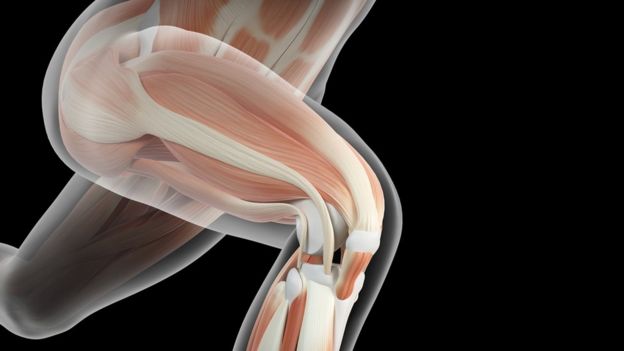Older women who have strong legs are likely to fare better when it comes to ageing of the brain, a decade-long study of more than 300 twins suggests.
The King's College London team says leg power is a useful marker of whether someone is getting enough exercise to help keep their mind in good shape.
Exercise releases chemicals in the body that may boost elderly brains, say the scientists, in the journal Gerontology.
But they say more research is needed to prove their hunch.
It is difficult to untangle leg strength from other lifestyle factors that may have an impact on brain health and the study did not look specifically at dementia, experts say.
Leg power

The researchers tracked the health of more than 150 pairs of twin sisters aged between 43 and 73 at the start of the study.
Leg power was measured (at the start of the study) using a modified piece of gym equipment that measured both speed and power of leg extension, while brain power was measured (at both the start and the end of the study) using computerised tasks that tested memory and mental processing skills.
Generally, the twin who had more leg power at the start of the study sustained their cognition better and had fewer brain changes associated with ageing measured after 10 years. And the finding remained when other known lifestyle and health risk factors for dementia were included.
Lead researcher Dr Claire Steves said: "When it came to cognitive ageing, leg strength was the strongest factor that had an impact in our study.
"Other factors such as heart health were also important, but the link with leg strength remained even after we accounted for these.
"We think leg strength is a marker of the kind of physical activity that is good for your brain."
Alzheimer's Society director of research Dr Doug Brown said the findings added to the growing evidence that physical activity could help look after the brain as well as the body.
"However, we still don't fully understand how this relationship works and how we can maximise the benefit," he said.
"And we have yet to see if the improvements in memory tests actually translate into a reduced risk of dementia."
Alzheimer's Research UK director of research Dr Simon Ridley said: "We know that keeping active generally can help reduce dementia risk, and it's important to take into account strength training as well as aerobic exercise."
Latest Stories
-
Parliamentary disruption is a self-inflicted wound – Speaker’s lawyer criticises Supreme Court plaintiff’s actions
17 mins -
Seeds are more expensive than gold – Netherlands Ambassador calls for collective action on Agrobiodiversity
41 mins -
Grandad Sings: The 92-year-old TikTok sensation
1 hour -
‘No-one will win’: Canada, Mexico and China respond to Trump tariff threats
1 hour -
Kenya less open to visitors despite visa-free policy – report
2 hours -
New Mauritius PM has reservations about UK’s Chagos deal
2 hours -
Trump picks Covid lockdown critic to lead top health agency
2 hours -
Drake takes legal action over Kendrick Lamar’s Not Like Us
2 hours -
We’re too boring for kids for social media ban – LinkedIn tells court
2 hours -
Celebrating Prempeh, the Asantehene banished by the British
3 hours -
Nigeria boat accident leaves five dead, 20 missing
3 hours -
2024 All Africa Challenge Trophy: Morocco to host Women’s Golf event slated for November 28
4 hours -
Best doctors in America are Nigerians – Davido
5 hours -
Prosecutors demand 20-year jail sentence for husband in mass rape trial
5 hours -
Man City throw away 3-0 lead to draw with Feyenood
5 hours

